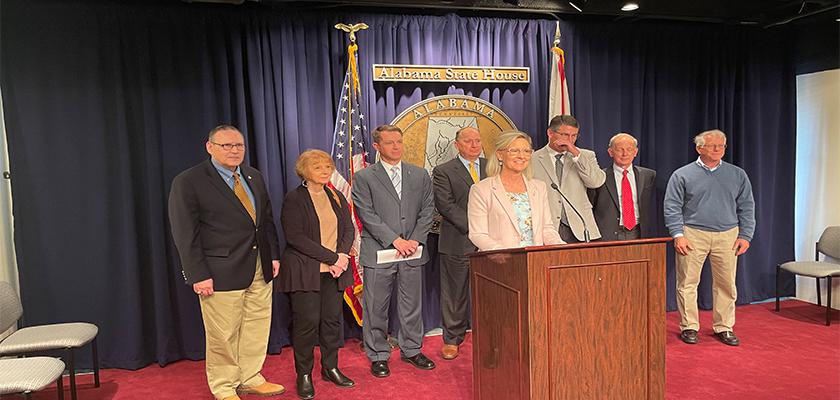The Eagle Forum of Alabama (EFA) held a press conference on Thursday calling on the legislature to address the access of transgender procedures to minors.
The bill in question is Senate Bill 184 (SB184), sponsored by State Sen. Shay Shelnutt (R-Trussville) and State Sen. Gerald Allen (R-Tuscaloosa). SB184, called the Alabama Vulnerable Child Compassion and Protection Act, seeks to make illegal the use of puberty blockers, trans sex hormones and surgeries that would alter or remove healthy tissue from underage people. Certain exceptions apply to intersex individuals and those diagnosed with developmental disorders. According to the bill, any transgender hormones or surgeries would not be available to a person until the age of 19.
SB184 has already been through the Senate and the House Judiciary Committee but is waiting to be put on the House’s Special-Order Calendar by the House Committee on Rules. Supporters of the legislation are attempting to compel the legislature to put the bill to a vote before the end of the legislative session.
Becky Gerritson, the executive director of EFA, took to the podium to call on the Alabama House of Representatives to bring the bill to the floor. She was joined by Shelnutt, two physicians, Wes Allen (R-Troy) (who proposed an identical bill in the House of Representatives), and others.
“There is an alarming trend we have seen in America,” Gerritson said. “Over the last six years, there has been a 5,000% increase in children seeking treatment for gender dysphoria, and most of those are early adolescent females. However, studies show that if a gender dysphoric child is left alone to go through natural puberty, up to 98% of them will grow out of it when they hit adulthood.”
Gender Dysphoria (GD) is a well-known and documented psychological phenomenon that occurs when a person has a consistent discomfort with their biological sex. GD has traditionally affected around 0.01% of the population.
While some studies state that 98% of GD resolves itself, most conclude that the number is anywhere from 70–90%.
Popular modern treatments of GD in adolescence include giving exogenous hormones that are typical of the sex with which a person identifies. Puberty blockers are also offered, which halt the natural developmental processes of an adolescent, so the sexual organs do not reach maturity. Surgical procedures are also available, including vaginoplasty, phalloplasty, mastectomy and several others.
Gerritson says that the invasive and irreversible effects of the hormone and surgical treatments are cause for preventing the treatments statewide. She also stated that basing a medical diagnosis on a child’s feelings is not prudent since the presence of GD is not something that can be measured or detected medically.
“Both [transgender] boys and girls must take powerful hormones for the rest of their lives,” Gerritson said. “This imposes irreversible sterilization and lifetime emotional damage, inevitably resulting in transgender regret. Again, the diagnosis is made on the child’s feelings.”
Allen said that he has been in continuing conversations with Speaker of the House Mac McCutcheon as well as House leadership in trying to get the bill to the House floor.
“It’s a very important bill to protect our kids,” Allen said. "We’ve got the support in the House to pass the bill. We are looking forward to taking a vote on it if we can get it to the floor.”
Shellnut said that the bill had an “easy time” in the Senate and pushed for it to get a vote in the House.
Bill Whitaker, a pediatrician who supports the legislation, told 1819 News that laws in the state do not currently require a person 14 or older to have parental consent is accessing cross-sex hormones.
“The current age in Alabama state law is that a child who is 14 or older can make their own medical decisions,” Whitaker said.
“Gender dysphoria is a very difficult suffering that these children go through, and our society has always tried to protect the most vulnerable. And these children have many underlying vulnerable problems in terms of depression, anxiety, childhood trauma, social issues. And our bill simply protects them from lifelong, irreversible, harmful, dangerous and experimental chemicals, drugs and surgeries at a time where minors are not capable of making that kind of forward-thinking, rational decision. The brain doesn’t [fully] develop until age 25.”
Dr. George Walker, who also spoke in favor of the bill, claimed that there is a bevy of psychological issues that typically accompany GD and transgenderism.
“A lot of parents don’t understand that very few people are actually transgender in our society compared to the general public,” Howard said. “The vast majority of these children would never become a transgender person in their adulthood. But the large majority of children who are taken at 12 or 13 to these clinics do, once they are put on Lupron or one of the puberty suppressants.
“We know from the last 40 years of detailed, frequent and consistent studies that these individuals have huge psychiatric issues later in life. In 2015, they had a transgender survey that went out to 70,000 transgender individuals, and 40% of these said that at some time during their life, they had attempted suicide.”
No word has been given as to if or when the bill will be put before the House, but supporters are hopeful that they will get a vote before the session ends. Thursday was the 26th legislative day in the House, leaving only four more days before the end of the 2022 regular session.
To connect with the author of this story, or to comment, email craig.monger@1819news.com










